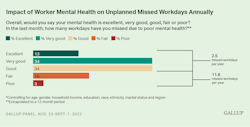One way to measure how poor mental health is affecting companies is to look at unplanned absences. A recent Gallup poll found that 19% of workers rated their mental health as poor. Those workers will have nearly 12 days of unplanned absences compared to 2.5 days for workers not reporting mental health issues.
The cost of that missed work is $47.6 billion annually in lost productivity. The cost of a missed day of work is estimated to be $340 per day for full-time workers, according to Gallup which conducted the poll from August 23- Sept. 7, 2022.
Looking at the demographics of this, both women and young workers report higher rates of struggling with mental health issues. Women (23%) are more likely to report poor or fair mental health than men (15%). Nearly one-third of young workers under the age of 30 (31%) do the same compared with 11% of those aged 50-64 and 9% of those aged 65 and over.
Consequently, working women under the age of 30 carry the greatest burden of fair or poor mental health (36%) across all age-by-gender subgroups.
Is work the cause of poor mental health? Partially, according to the poll. The survey found that 40% of workers say their job has an extremely negative (7%) or somewhat negative (33%) impact on their mental health, compared with three out of 10 who report an extremely positive (7%) or somewhat positive (23%) impact.
Companies have been trying to address this issue through workplace programs, but it seems the message hasn’t yet reached many employees. A majority (57%) said they were unable to confirm the existence of easily accessible mental health support services in their workplace -- 24% report the absence of these services, and another 33% are unaware if they are even available through their employer.
Fifty percent or more of employees in 11 of the 16 reportable industries either report the absence of easily accessible mental health support services in their workplace or are unaware if they exist, including 75% of employees in construction.

